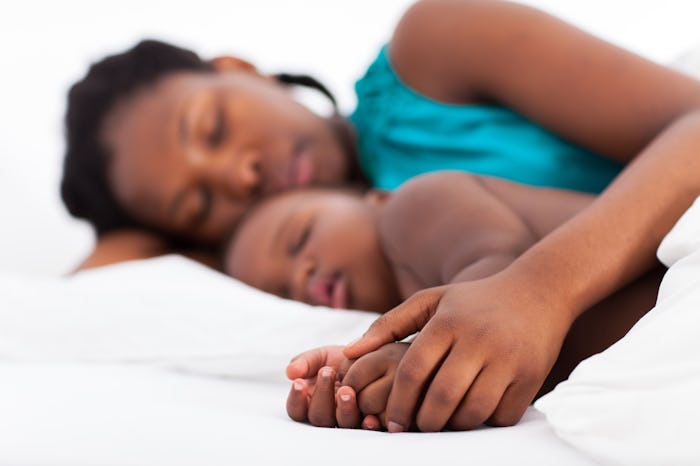Life

The Bed-Sharing Red Flags You Need To Know About
Before you became a parent, it's impossible to imagine the controversy surrounding the topic of bedtime. And the options available for infant sleep, with their many advocates and detractors, can make your head spin. If you decide to give bed-sharing a try, for instance, then it's smart to know the bed-sharing red flags that parents should watch out for.
First, it's helpful to understand what bed-sharing is, and why this method of sleeping is somewhat controversial. According to Baby Center, bed-sharing refers to the practice of sharing a bed with your child. This is in contrast to co-sleeping, in which your baby sleeps in your bedroom on a separate sleep surface. With that in mind, it's worth noting that the American Academy of Pediatrics (AAP) recommends against bed-sharing, which the organization noted is the greatest risk factor for infant deaths that are associated with sleep. Despite these dangers, some families find that bed-sharing works best for their situation.
With that in mind, there are plenty of steps you can take to make sure your bed is safer for your baby. In fact, many of the accessories that make an adult bed lovely for your own sleeping habits may act as hazards to a young baby. But by learning about the potential dangers of bed-sharing, you can mitigate the risks should you decide to give it a go.
1Loose Pillows And Blankets
Unfortunately, many of the pillows, stuffed animals, and blankets that make a bed look so inviting could act as hazards to your newborn. According to the AAP, a safe sleep environment for infants is free from toys, blankets, and pillows, which could act as suffocation hazards. In general, a more Spartan sleeping space is better for your baby.
2Soft Mattress
A soft, fluffy mattress may feel divine to you, but it could spell trouble for your baby. As noted in Kids Health, a soft mattress, such as one made from memory foam, may present a suffocation hazard to your baby. In general, firm sleeping surfaces are safer.
3Extreme Parental Fatigue
Granted, most parents of newborns are not the most well-rested people in the world. But as explained in Kids Health, parents who are extremely fatigued may not be as attuned to the needs of their infants while sleeping. Basically, simply being exhausted may present some hazards to bed-sharing infants.
4Overheating
Helping your baby remain at the right temperature while sleeping can be a fretful exercise for many parents. And, on an alarming note, overheated babies are at an increased risk for SIDS, as explained by the National Institute of Child Health and Human Development (NICHD). As further noted by the NICHD, getting too warm may encourage your baby to fall into a deep sleep from which it is difficult to awaken them. What's more, bed-sharing may increase this risk of overheating, as it can be difficult to judge the amount of body heat given off by parents, according to the website for Dr. Sears. Taking care not to over-bundle your baby is crucial.
5Nearby Draperies Or Blinds
Even decorations that aren't a part of your bed may pose a hazard. According to Johns Hopkins All Children's Hospital, if your draperies or blinds are near the bed, these could pose a strangulation hazard to your baby. In fact, it's a good idea to know how to child-proof all of your blinds and window treatments to reduce this hazard.
6Preterm Babies
Much of the advice given to new parents can be on the subjective side, but sometimes prominent organizations come down hard on one side of an issue. For instance, a piece in the October 2016 issue of Pediatrics strongly recommends against bed-sharing with any infant born preterm. Because preterm infants are at an increased risk of SIDS, these babies are at an elevated risk for the usual dangers associated with bed-sharing.
7Parental Smoking Habits
Although it may seem like an unusual habit to come up in the context of bed-sharing, smoking is another concern. As explained in a 2005 piece in Pediatrics, because exposure to cigarette smoke appears to be correlated to an increased risk of SIDS, babies exposed to such smoke should not bed-share. The combined SIDS risks of these two activities is difficult to overstate.
8Other Children In Bed
What's more adorable than the sight of siblings peacefully dozing together? It's a dream image for many parents, but NIH noted that the risk of SIDS increases five times when other children are also in the family bed. In general, children may not be able to maintain awareness of the baby while sleeping.
9Parental Alcohol Or Drug Use
That second glass of wine may not be a great call when you're sharing the bed with a baby. As noted by the University of Notre Dame's Mother-Baby Behavioral Sleep Laboratory, anyone who is feeling the affects of alcohol or other sedatives may not be able to wake up from sleep easily enough to bed-share safely with an infant. In these instances, the baby is probably safer on a separate sleep surface.
10Second Partner In Bed
Having your partner in the family bed isn't inherently terrible. But it's important to make sure your partner is also able to sleep safely with the baby around, and isn't in danger of rolling onto the little one while sleeping. The same concerns about avoiding smoking and sedatives also apply to any other adult in the bed.
11Bed Frame Designs
It's also worth taking a hard look at your bed frame. According to Kids Health, frames that are big enough for your baby's head to fit in may pose strangulation hazards. In these cases, a less ornate bed frame may be a safer idea.